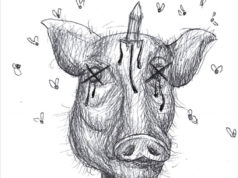“I woke up in a puddle of my vomit … I might have stopped breathing … I might have been slipping into a coma … I might have actually temporarily died. I can’t say for sure.”
“Sdragoon” wrote the above blog post about an experience he had huffing gasoline, a horrendous but popular pastime among teens who can’t afford to buy good drugs. Neurological damage and respiratory problems are among the problems associated with the habit.
So Static’s Scooby Radar went “ruh roh” after local news media quoted a state environmental regulator who compared sniffing gasoline to breathing fumes emitted by some gas well operations. Michael Honeycutt, who heads the Texas Commission on Environmental Quality’s toxicology division, told WFAA/Channel 8 News that air samplings around some gas wells revealed high levels of cancerous toxins.
“That would be equivalent to opening a can of gasoline and holding it up under your nose,” he said.
TCEQ officials say they’re on the case – and that it will only take several years to implement new rules to force gas drillers to restrict the amount of benzene and other pollutants they put into our skies. More testing has to be done, yada yada. In the meantime, state regulators are asking drillers to voluntarily control their emissions.
Taking three years to change rules about a substance that is potentially poisoning people can only be described as bureaucratic banality gone wild. And trusting the gas drilling industry to regulate itself in the meantime is ridiculous. These same drillers have been spewing filth, ruining water supplies, spreading around lobbyist money to keep state laws stacked in their favor, and otherwise playing dirty pool since Day One of the Barnett Shale play. TCEQ officials must have been huffing gas themselves if they expect drillers to give a damn about anything but profit margins.
As for City of Fort Worth officials, who have ignored the environmental effects of gas drilling for lo these many years: Can you sleep at night?
You Saw It Here First
Next week, the Center for Public Integrity, a nonprofit journalism group that is a powerhouse of major national-scope investigative stories, will release a report on the “culture of secrecy surrounding sexual assault on college campuses across the country.” The stories and other info that will go up on the group’s web site (www.publicintegrity.org), according to a CPI press release, are the result of a nine-month investigation into how campus rapes and other assaults are handled by school administrations.
To which Static says: Hallelujah! Maybe now some other folks will pay attention to what Fort Worth Weekly, student journalists across Texas, and campus newspapers in Fort Worth, Dallas, Stephenville, Huntsville, and Denton have been writing for the last five years and in some cases much longer than that.
Repeatedly, student journalists have written about the tendencies of campus police departments to downplay or ignore rape, label rapes as lesser crimes, and discourage young women from reporting rapes. Date rape in particular gets short shrift. College cops in many cases have refused to alert students on their campuses – as required by the federal Clery Act – to those incidents because, hey, surely a date-rapist isn’t going to bother anybody else, right?
A December 2004 Weekly cover story (“Insecurity on Campus”), done by student journalists under the direction of their professors and Weekly editors, with extensive support from the Freedom of Information Foundation of Texas and the University of North Texas, was a statewide look at the failures of college administrators to come clean about crime. And it’s still happening, as another Weekly story earlier this month (passing along what Tarleton State U. students had uncovered) makes clear.










